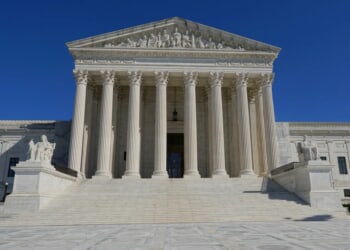You can always rely on George Will to invoke the Munich analogy when urging the United States to become further embroiled in wars. The other day, the Washington Post’s favorite conservative columnist trotted out Munich to accuse President Trump, Vice President JD Vance, and Defense Secretary Pete Hegseth of “appeasement” of Russia’s Vladimir Putin in relation to the Ukraine war.
Will dragged out the ghost of Neville Chamberlain and compared Ukraine to Czechoslovakia in the late 1930s. Putin is Hitler, of course, who Will says (quoting neoconservative Hal Brands) is waging a “quasi-genocidal war,” and Trump’s quest for a ceasefire to stop the killing is, Will writes, equivalent to Chamberlain’s boast of “peace for our time.” (RELATED: National Review Sides With the War Party Again)
The analogy, of course, is false on its face. Munich involved Chamberlain and France’s leaders attempting to avoid war. The Munich moment for Ukraine, if there was one, came in early 2022, when Russian troops massed on Ukraine’s border and Will’s favored presidential candidate in the 2020 election, Joe Biden, did nothing. Worse was to come. (RELATED: Biden’s Foreign Policy Was a Colossal Failure — From Ukraine to China)
The administration that Will voted for responded to Russia’s invasion by sending Ukraine enough military and financial aid to continue the slaughter of Ukrainians and Russians but did little, if anything, to bring about a diplomatic end to the war. (RELATED: The Biden Trap)
By the time Donald Trump returned to the White House in January 2025, hundreds of thousands of Ukrainians and Russians were casualties in a war neither side was winning. Trump’s goal is to end the fighting by negotiating a ceasefire and to stop a regional war from becoming a world war. That, Will writes, is a “spurious” realism, which he claims is paving the way to a wider war due to “U.S. leaders’ ignorance of history.”
Ah, yes, history and Munich — the analogy Will reaches for again and again.
In 1977, Will entitled a column “Israel and Munich,” wherein he compared America’s treatment of Israel in the mid-to-late 1970s with Britain’s treatment of Czechoslovakia at Munich in 1938.
In a June 13, 1996, column supporting the first round of NATO enlargement (which George Kennan called the most fateful error of U.S. foreign policy in the post-Cold War world, and which 50 Russia and national security experts publicly opposed), Will invoked the Munich analogy, decried appeasement, and claimed that “what would be enlarged with NATO would be central Europe’s prospects for … deterrence and democracy.”
A year before that, Will, in a series of columns, urged the Clinton administration and NATO to intervene in Bosnia, again invoking memories of World War II. And Will originally supported the Afghan and Iraq wars, including nation-building efforts that led to the debacle of “endless wars,” only to later judge the Iraq war to be a historic blunder.
Last year, Will criticized Republicans who voted against continuing to aid Ukraine by writing about the new “Axis” powers of Russia, China, and Iran who, “as in the 1930s, [are] watching” the West’s response.
In a Feb. 1, 2025, column, Will, on the one hand, writes that Russia “is hardly an irresistible force,” but then warns that a Ukrainian collapse “presag[es] another war.” You get it — just like the collapse of Czechoslovakia presaged World War II.
Perhaps Mark Episkopos was right when he argued that it was time to retire the Munich analogy. Its misuse has led to American foreign policy blunders from Vietnam to Iraq to Ukraine. History can be a great teacher, but its lessons should produce humility and prudence when applied to contemporary events. George Will’s self-touted “conservative sensibility” apparently missed that lesson.
READ MORE from Francis P. Sempa:
Nixon–Mao, Trump–Putin, and Triangular Diplomacy
National Review Sides With the War Party Again





![Trump's Admin Guts Another ‘Rogue Government Agency with Zero Accountability’ [WATCH]](https://www.right2024.com/wp-content/uploads/2025/03/Trumps-Admin-Guts-Another-‘Rogue-Government-Agency-with-Zero-Accountability-350x250.jpg)



![‘We All Owe Him (Elon) a Huge Debt of Gratitude’ [WATCH]](https://www.right2024.com/wp-content/uploads/2025/03/‘We-All-Owe-Him-Elon-a-Huge-Debt-of-Gratitude-350x250.jpg)
![NCAA Champ Salutes President Trump After ‘BIGGEST UPSET IN COLLEGE WRESTLING HISTORY’ [WATCH]](https://www.right2024.com/wp-content/uploads/2025/03/NCAA-Champ-Salutes-President-Trump-After-‘BIGGEST-UPSET-IN-COLLEGE-350x250.jpg)






